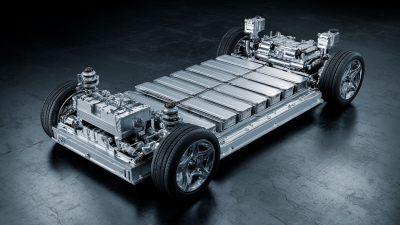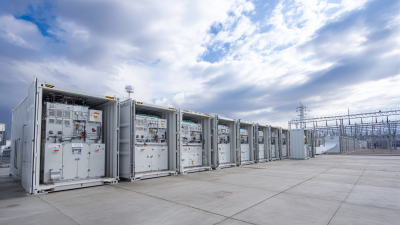5 Reasons Why Lithium Power Battery Solutions Are Essential for Modern Energy Needs
As the world rapidly shifts towards sustainable energy solutions, lithium power batteries are emerging as a cornerstone of modern energy needs. According to the International Energy Agency (IEA), global demand for lithium-ion batteries is projected to exceed 2,500 GWh by 2030, driven by the urgent need for renewable energy storage and electric vehicle adoption. A recent report by BloombergNEF predicts that electric vehicle sales will soar to over 10 million units by the end of the decade, a trend that underscores the critical role of lithium power battery technology. This transition not only enhances energy efficiency but also supports grid stability and reduces greenhouse gas emissions—all essential objectives in combating climate change. In this blog, we will explore five compelling reasons why lithium power battery solutions are indispensable in meeting today’s energy challenges and ensuring a sustainable future.
The Growing Demand for Sustainable Energy Solutions
As the world increasingly shifts towards sustainability, the demand for energy solutions that are both efficient and environmentally friendly has surged. The electric power market is expected to experience significant growth, with figures projected to reach $14.92 billion by 2024. This growth is fueled by the rising need for data centers, renewable energy integration, and innovative technologies that can enhance energy management.
Lithium power battery solutions emerge as paramount in this landscape, offering the much-needed efficiency and effectiveness to meet modern energy requirements.
The emphasis on sustainable energy solutions is not just a trend but a necessity in our evolving energy ecosystem. Increasing urbanization and the development of smart cities further drive the demand for clean and reliable energy. Innovations in battery technology, particularly lithium-based solutions, are critical in supporting renewable energy integration, thereby optimizing energy storage and utilization. As we face the challenges of climate change and resource scarcity, lithium power battery technologies will undoubtedly play a pivotal role in shaping a sustainable energy future.
Efficiency and Longevity: The Benefits of Lithium Power Batteries
Lithium power batteries have revolutionized the energy landscape, offering unmatched efficiency and longevity that are essential for contemporary energy requirements. One of the standout advantages of lithium batteries is their energy density; they can store more energy in a lighter package compared to traditional battery technologies. This feature makes them ideal for applications ranging from electric vehicles to renewable energy storage systems, where space and weight efficiency are paramount. As the world moves towards greener alternatives, the demand for high-performing batteries continues to rise, solidifying lithium's place as a leader in the energy sector.
In addition to their impressive energy density, lithium power batteries also exhibit remarkable longevity. With a typical lifespan of over a decade, these batteries reduce the need for frequent replacements, leading to lower overall costs and less environmental impact. Their ability to withstand numerous charge and discharge cycles without significant degradation ensures that devices and vehicles powered by lithium batteries maintain peak performance for longer periods. This longevity not only contributes to sustainability efforts but also fosters a more reliable energy supply, making lithium power batteries an essential component of our modern energy infrastructure.

Lithium Batteries vs. Traditional Energy Storage Options
When comparing lithium batteries to traditional energy storage options, the differences become strikingly clear in terms of efficiency, longevity, and environmental impact. Traditional lead-acid batteries, while tried and tested, tend to have shorter lifespans and require frequent maintenance. They are also considerably heavier, making them less suitable for mobile applications.
In contrast, lithium batteries offer a higher energy density, meaning they can store more energy in a smaller and lighter package, which is increasingly important in our on-the-go world.
Moreover, lithium battery technology demonstrates greater efficiency in charging and discharging cycles. With faster charge times and the ability to withstand more cycles, they minimize downtime and contribute to overall energy reliability. Additionally, the environmental benefits of lithium batteries cannot be overlooked; they are more recyclable and sustainable than traditional options, which often contain harmful materials and heavy metals. This shift not only aligns with the global push for greener technologies but also paves the way for innovations in renewable energy systems, enhancing their practicality and reducing dependence on fossil fuels.
Applications of Lithium Power Batteries in Various Industries
Lithium power batteries have become indispensable across various industries, driving innovation and efficiency. In the automotive sector, electric vehicles (EVs) rely heavily on lithium-ion batteries for their energy needs. These batteries offer exceptional energy density and longevity, enabling EVs to achieve longer ranges and faster charging times. As governments worldwide push for greener transportation solutions, the demand for lithium-powered vehicles continues to surge, positioning this technology as a cornerstone of modern mobility.
In addition to transportation, the renewable energy sector greatly benefits from lithium power batteries. They play a critical role in energy storage systems, allowing for the effective capture and distribution of solar and wind energy. By storing excess energy generated during peak production times, these batteries ensure a consistent power supply during periods of low generation. This capability not only enhances the reliability of renewable energy sources but also supports grid stabilization and reduces dependence on fossil fuels. Furthermore, lithium batteries are also making inroads in industries like consumer electronics and aerospace, where their lightweight and high-performance characteristics are imperative. As these applications expand, the importance of lithium power batteries in shaping a sustainable energy future becomes increasingly evident.

Future Innovations in Lithium Battery Technologies and Their Impact
The future of energy storage is undeniably tied to advancements in lithium battery technologies. As industries push for cleaner energy alternatives, innovative lithium power solutions are set to revolutionize how we harness and utilize energy. According to a report by the International Energy Agency (IEA), the global demand for lithium batteries is expected to reach approximately 1,000 GWh by 2030, highlighting their crucial role in sustaining energy needs across various sectors.
Investments in solid-state battery technology, for instance, promise significant improvements in energy density and safety. These next-generation batteries could redefine the benchmarks for electric vehicle (EV) performance, enabling longer ranges and faster charging times. Additionally, research from BloombergNEF indicates that by 2025, lithium-ion battery prices are projected to fall below $100 per kilowatt-hour, making these technologies even more accessible for widespread adoption in renewable energy systems.
**Tip 1:** Stay informed about the latest lithium battery innovations to identify opportunities for investment or adoption in your energy solutions.
**Tip 2:** Consider exploring partnerships with tech startups focusing on battery technology, as they often lead the charge in innovative solutions that can address current energy challenges.
The potential advancements in lithium battery technologies will not only influence the EV market but also enhance grid storage capabilities, ensuring a sustainable energy future with reliable power supply.
5 Reasons Why Lithium Power Battery Solutions Are Essential for Modern Energy Needs
This bar chart illustrates the growing importance of lithium power battery solutions in various sectors, showcasing their potential impact on modern energy needs.












